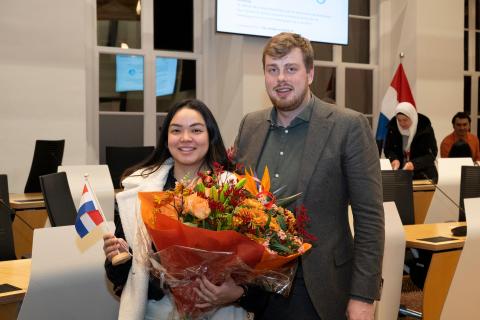More people acquired Dutch citizenship again in 2023
Up to 1 December this year, almost 48 thousand people acquired Dutch citizenship by naturalisation (47,890). This is more than in the same period last year (44,170). These were almost 35 thousand adults and about 13 thousand children.
In the first eleven months of this year, the Immigration and Naturalisation Service (IND) has handled almost 50 thousand applications for naturalisation (49,360). A large number of the applicants for naturalisation had a residence permit for residence with a family member or relative (14,020) or an asylum residence permit (12,400). The most frequently occurring nationality of the applicants is Syrian.
The IND will publish these figures in the run-up to Naturalisation Day next Friday 15 December.
Already many naturalisations for a longer time
Up to 1 December 2023 the IND took about 49 thousand decisions on naturalisation applications. The number of decisions on naturalisation has already been high for a few years. In 2022 there were more than 51 thousand decisions (51,480) and in 2021 there were almost 56 thousand (55,930). In comparison: in 2019 about 27 thousand decisions were taken (27,090).
The increase is the result of the number of migrants who came to the Netherlands in the years before. After they have resided lawfully in the Netherlands for three or five years they can submit an application for naturalisation. In addition whey must meet several other requirements.
The King decides on naturalisation
A person who wants to acquire Dutch citizenship submits a naturalisation application to the municipality. The IND assesses the application. The applicant receives a letter from the IND if the decision is positive. It is stated in the letter that a proposal for granting Dutch citizenship has been presented to the King. The King takes the formal decision. Then the applicant receives an invitation to a naturalisation ceremony from the municipality Afterwards a person is officially a Dutch citizen. This means, among other things, that the person may henceforth vote in all elections in the Netherlands and may hold all public positions.

Naturalisation ceremony in Utrecht
Making services ready for more applications
Irlan Agous is responsible for handling naturalisation applications at the IND. 'In the past few years we have invested a lot in order to continue providing timely and careful services, also in the event of large numbers of applications. Components of the process have been digitised. We have also engaged more people to handle naturalisation applications, and staff members are supervised better. Because of this an applicant now obtains clarity much more quickly than before.'
Agous continues: 'We can exactly predict how many naturalisation applications will be received. We already know now that from mid-2025 and 2026 we will be very busy again. In order to be well prepared for this we are now already working on a smarter organisation of the process, mainly in our cooperation with municipalities. For example by using the same sources of information in order to prevent duplicate information and repair work. This is how we make and keep our services increasingly smarter and we keep the waiting times short. Nice for us and for the applicants.'
Another possibility to acquire Dutch citizenship
No everyone who has been in the Netherlands for a longer time chooses naturalisation. For example because then people have to renounce the nationality they already have. In certain situations it is also possible to acquire Dutch citizenship via an Option. In that case the municipality decides on the application.
Related news
IND annual report 2024: more penalties because of more legal proceedings
Once again, the Immigration and Naturalisation Service (IND) got more work done in 2024 than in ...
IND signs Direct Clear Deal and makes letters even more understandable
Communicating in clear language so that every applicant understands what the IND means. The Immigration and ...
IND deciding again on asylum applications from Sudan
The Immigration and Naturalisation Service (in Dutch: Immigratie- en Naturalisatiedienst, or IND) is going to decide ...